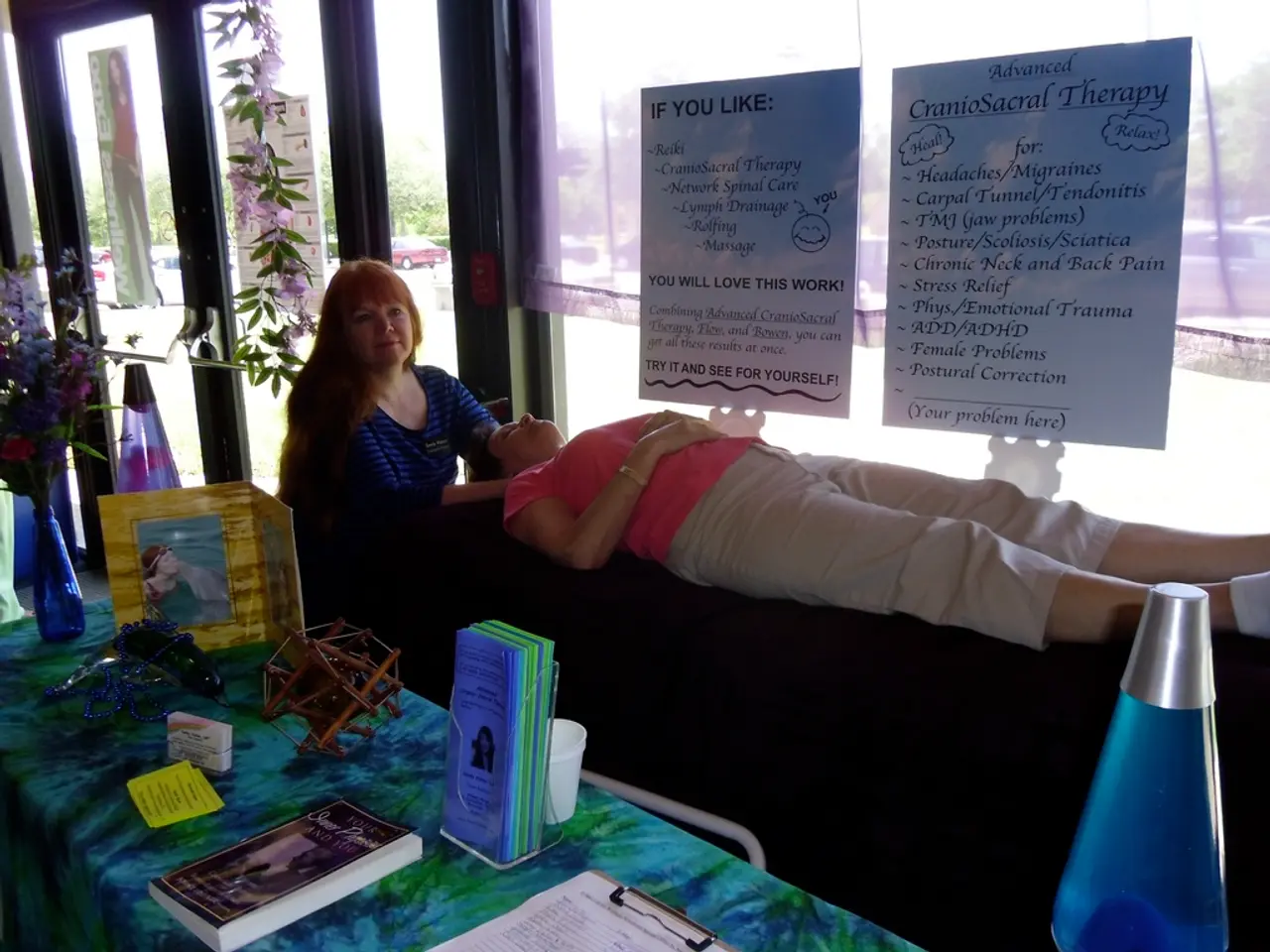Relief methods for pinched nerves: Discover 10 strategies for alleviation
In the realm of common health concerns, a pinched nerve can be a troublesome issue for many individuals. This article offers a concise guide on effective home treatments and self-care practices for pinched nerve relief, along with valuable advice on when to consult a medical professional.
For those experiencing persistent or recurring symptoms from a pinched nerve, it is essential to seek the advice of a doctor. In some cases, a chiropractor may be able to help, but the effectiveness of treatment depends on the cause and the technique used.
Home treatments for a pinched nerve primarily focus on relieving pressure, reducing inflammation, and supporting nerve healing. Rest and avoiding aggravating activities are key components of effective home care, giving the affected area time to heal by avoiding repetitive motions or positions that worsen symptoms.
Cold therapy, such as applying ice packs wrapped in a towel to the affected area, can reduce inflammation and numb pain, providing relief. Wrist splints or braces, particularly for pinched nerves in the wrist like carpal tunnel syndrome, help reduce nerve compression, especially during sleep or activities that trigger symptoms.
Gentle stretching and exercises, particularly for pinched nerves in the neck, can help relieve pressure. Examples of effective exercises include cervical retraction, chin tucks, neck extensions, and gentle traction exercises. Massage therapy can also provide relief by relaxing tight muscles, improving blood flow, and easing discomfort associated with pinched nerves.
Maintaining good posture, especially avoiding forward head posture during activities like computer or phone use, can help reduce nerve compression. Alternating between heat and ice packs may help reduce swelling and inflammation associated with pinched nerves. Stretching before or after low-impact exercises can help keep the body flexible and reduce pressure and inflammation near the nerves.
Losing excess weight can help reduce pressure on the nerves, potentially alleviating symptoms. Elevating the legs can provide relief for people with pinched nerves in the back by reducing pressure on nerves.
It is important to approach these home treatments gently to avoid aggravation. If symptoms persist or worsen, professional evaluation and treatment—such as chiropractic adjustments, spinal decompression therapy, or physical therapy—may be necessary to fully resolve the issue.
For severe cases or those caused by spinal degeneration, more intensive treatments may be required. In such cases, low-impact exercises, such as walking, swimming, or cycling, can help reduce symptoms in the long term. Good self-care, such as maintaining a healthy posture, can help prevent pressure from building up around the nerves.
A pinched nerve can be caused by a variety of factors, including sports injuries, repetitive movements, imbalanced posture, spinal curves, herniated disks, bone spurs, arthritis, spinal fractures, and extra pressure and weight from obesity. Doctors may use imaging tests, such as MRI or CT scans, or an electromyography test to diagnose and treat a pinched nerve.
Treatment options for a pinched nerve may include pain medications, corticosteroids, physical therapy, injections, or surgery in severe cases. However, surgical treatment comes with risks and complications, so anyone considering surgery should work closely with their doctor to find a treatment plan tailored to their personal needs.
Symptoms requiring immediate medical attention include a pinched nerve affecting the bladder, an inability to grip objects or a tendency to drop things, and nerve damage causing a limb or area of the body to give out or collapse.
In summary, rest, cold therapy, wrist splints (if applicable), gentle exercises, massage, and good posture are key components of effective home care for pinched nerve relief. Adequate nutrition, particularly B vitamins, is important for the proper functioning of nerves. Good self-care and maintaining a healthy lifestyle can help prevent pressure from building up around the nerves and alleviate symptoms. Always consult a doctor if symptoms persist or worsen.
- For those experiencing persistent or recurring symptoms from a pinched nerve, professional evaluation might be necessary, especially if home treatments prove ineffective.
- Maintaining good posture, particularly during activities involving computers or phones, can help reduce nerve compression and prevent the onset of pinched nerves.
- In addition to home treatments, maintaining a healthy lifestyle, such as proper nutrition, can help support the health of nerves and ensure their proper functioning.
- For people with pinched nerves in the back, elevating the legs can help reduce pressure on the affected nerves, providing relief.
- In severe cases of pinched nerves, treatments may include physical therapy, injections, or even surgery, depending on the individual's personal needs and the severity of the condition.
- Seek immediate medical attention if a pinched nerve affects bladder control, causes an inability to grip objects, or results in a limb or body part giving out or collapsing, as these can indicate nerve damage.




